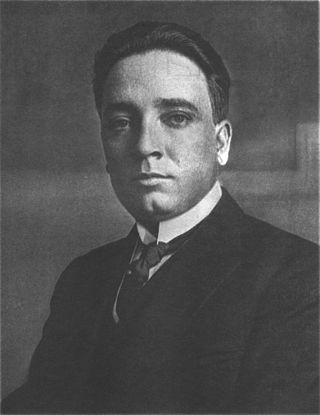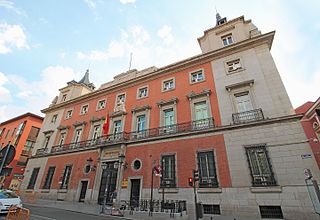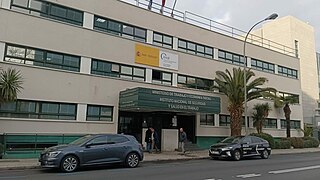
Baltasar Brum Rodríguez, GCTE was a Uruguayan political figure. He was President of Uruguay from 1919 to 1923.

The Ministry of the Interior and Public Security is the cabinet-level office of home affairs in Chile, in charge of "maintaining public order, security and social peace" within the country. It is also charged with planning, directing, coordinating, executing, controlling, and informing the domestic policies formulated by the President of Chile. As responsible for local government, the minister supervises all non-elected regional authorities.

The Royal Norwegian Ministry of Labour and Social Inclusion is a Norwegian ministry established in 1846. It is responsible for the labour market, the working environment, pensions, welfare, social security, integration, immigration and asylum. Since 2023 the ministry has been led by Tonje Brenna of the Labour Party.
The Ministry of the Interior of Uruguay is the ministry of the Government of Uruguay that is responsible for controlling, regulating and evaluating policies, programs and plans related to public safety, as well as guaranteeing citizens the free exercise of fundamental rights and freedoms.

The Ministry of Education and Culture of Uruguay is the ministry of the Government of Uruguay that is responsible for the coordination of national education, the promotion of the country's cultural development, the preservation of the nation's artistic, historical and cultural heritage, as well as innovation, science and technology and the promotion and strengthening of the validity of human rights. It is also responsible for the development of the state communication multimedia system and for promoting the digitized access of the entire population to information.
The Ministry of Economy and Finance of Uruguay is a ministry of the Government of Uruguay that is responsible for administering, improving and strengthening the finance of Uruguay through certain competent bodies. This secretary of state is responsible for accounting for the profits of a country through imports and exports. It is also responsible for requesting and paying loans, and for administering the money that is spent on the different state distributions, for which the National Budget is presented to the Parliament. The current Minister of Economy and Finance is Azucena Arbeleche, who has held the position since March 1, 2020.

The Ministry of the Interior (MIR) is a department of the Government of Spain responsible for public security, the protection of the constitutional rights, the command of the law enforcement agencies, national security, immigration affairs, prisons, civil defense and road traffic safety. Through the Undersecretariat of the Interior and its superior body, the Directorate-General for Internal Policy, the Ministry is responsible for all actions related to ensuring political pluralism and the proper functioning of electoral processes.

The Ministry of Justice (MJUS) was the department of the Government of Spain responsible for preparing and carrying out the government policy in order to bring the legal system off, specially in criminal, civil, commercial and procedural law affairs, supporting the Administration of Justice and the legal and international cooperation.

The Ministry of Labour and Social Economy (MITES) is the department of the Government of Spain responsible for planning and carrying out the government policy on labour relations and social economy.
A ministry of social affairs or department of social affairs is the common name for a government department found in states where the government is divided into ministries or departments. While there is some variation in the responsibilities of such ministries, the common thread between them is their responsibility for assisting members of society who are in a vulnerable position for example due to age, dependence on government aid, or being the employee in an employee/employer relationship. Ministries of this type cover matters such as social work, social protection and assistance, pensions, welfare, health and social security, and workplace standards for employees
A ministry of labour (UK), or labor (US), also known as a department of labour, or labor, is a government department responsible for setting labour standards, labour dispute mechanisms, employment, workforce participation, training, and social security. Such a department may have national or regional authority.

The Ministry of Education, Vocational Training and Sports (MEFPD) is the department of the Government of Spain responsible for proposing and carrying out the government policy on education and vocational training, including all the teachings of the education system except university education, without prejudice to the competences of the National Sports Council in matters of sports education. Likewise, it is also the responsibility of this Department the promotion of cooperation actions and, in coordination with the Ministry of Foreign Affairs, the promotion of international relations in the field of non-university education.

The first cabinet of Iuliu Maniu was the government of Romania from 10 November 1928 to 6 June 1930.
The Secretary of State for Migration (SEM) is a senior official of the Spanish Ministry of Labour, Migrations and Social Security responsible for developing the government's policy on foreigners, immigration and emigration. It also attends and advises the minister in the international meetings about these matters, especially in the European Union meetings.

The Ministry of Social Affairs (MAS), since 2023 known as Ministry of Social Rights, Consumer Affairs and 2030 Agenda, is a department of the Government of Spain responsible for the government policies on social services, family, minors protection, disability and prevention of youth crime, adoptions and foster care and the promotion of cultural communication and youth association. Likewise, the department is responsible for the government policies on animal welfare and UN Sustainable Development Goals.

The National Institute for Safety and Health at Work is an autonomous agency of the Government of Spain. The INSST is considered a technical-scientific agency entrusted with the task of analyze and research on safety and health conditions at work, as well of promoting and supporting the improvement of them, in order to achieve a decrease in occupational hazards, work accidents and occupational diseases.

The Ministry of Social Development of Uruguay is the ministry of the Government of Uruguay that is responsible for proposing, generating and activating national social policies. It is headquartered at 18 de Julio Avenue in Barrio Cordón, Montevideo. The current Minister of Social Development is Martín Lema, who has held the position since May 3, 2021, after Pablo Bartol was removed from office by the President.

The Ministry of Transport and Public Works of Uruguay is a ministry of the Government of Uruguay that is responsible for the development and planning of public infrastructure works in order to promote the national development of Uruguay.
The Ministry of Industry, Energy and Mining of Uruguay is a ministry of the Government of Uruguay that is responsible for formulating and promoting the industrial, energy and mining policies of the country.

The presidency of Luis Lacalle Pou began on 1 March 2020 when he was inaugurated as the 42nd president of Uruguay. Lacalle Pou, a member of the National Party took office following his victory over the Broad Front nominee Daniel Martínez in the second round of the 2019 general election, which ended the 15-year leftist rule in the country and the return of National Party to the Executive since his own father was the president in 1990–1995. On 16 December 2019, after his victory in the second round and before his inauguration, he announced his cabinet consisting of leaders of National, Colorado, Cabildo Abierto and Independent parties, members of the Multicolor Coalition.














